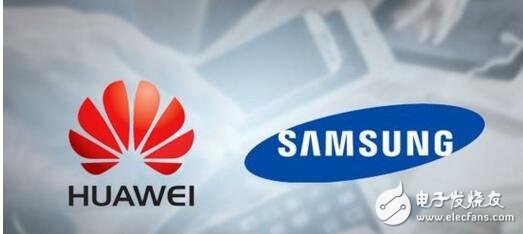Editor's note: In the first week of April, the scientific and technological community was not calm. Huawei received a paper ruling that it sued Samsung for patent infringement in May last year and got a court ruling. Samsung needs to compensate Huawei for 80 million yuan. This seems to be only the first round of the two patents. What will happen later? Observing; Qualcomm's $47 billion acquisition of NXP has been approved by US regulators, indicating that Qualcomm will play a major role in the field of car networking, car security and IoT security, in addition to the dominance of mobile chips; ARM's new DynamIQ architecture Laying the foundation for the next 10 years of development, it can be widely used in artificial intelligence, automotive and 5G fields.
Huawei wins Samsung patent infringement case
On April 6, 2017, Samsung Electronics was found guilty of infringement of patent rights and compensated China's Huawei Technologies for 80 million yuan. A Chinese court in Quanzhou City, Fujian Province, determined that Samsung Electronics’ three affiliated companies were required to compensate Huawei for the above amount on the grounds that it violated a mobile phone technology patent held by Huawei’s mobile phone division. Huawei filed a lawsuit in June last year. Samsung said that this is the first-instance judgment and will not affect its mobile phone sales in China, because it is expected that it will take several years to form a final judgment.
In May 2016, Huawei announced that it would file a lawsuit against Samsung in California and Shenzhen, China, requesting Samsung to compensate Huawei for its intellectual property infringement, including high-value patents involving communications technology and Samsung mobile phones. The software used.

In June 2016, Huawei Terminal Co., Ltd. filed a rights defense lawsuit in the Quanzhou Intermediate People's Court, and sued the defendant, such as Huizhou Samsung, to the court for a claim of 80 million yuan. In the face of huge claims, Huizhou Samsung said that Huawei did not provide evidence to prove that Huizhou Samsung, Tianjin Samsung, Samsung Company have joint infringement, especially the lack of evidence to prove that Huizhou Samsung, Tianjin Samsung constitute infringement, and Huizhou Samsung did not implement Huawei’s allegations. Infringement. Samsung said that there is no basis for Huawei to claim compensation of 80 million yuan.
Comments: The patent dispute between Samsung and Huawei reflects the fierce competition in patents in the mobile phone field. Samsung's mobile phone sales accounted for 22% of global mobile phone sales in 2016, and Huawei has rapidly increased. In 2016, sales accounted for 11% of the global market. Drexel Hamilton analyst Brian White said that Chinese smartphone maker Huawei may beat Samsung and become Apple's biggest competitor.
In addition, the patent wars of mobile phone giants, first of all, the huge patent revenue of smart phones. According to Gartner data, in a $400 smartphone, the total cost of parts is between $120 and $150, and the patent licensing fee exceeds this amount. Huawei’s lawsuit against Samsung lies in its strong underlying communications patents, but there are still gaps between Huawei and Samsung in mobile phone core patents. Samsung’s blocking of Huawei at the high end has also been fully launched.
Qualcomm's acquisition of NXP is approved by US regulators
On April 4th, US time, US smart chip maker Qualcomm Incorporated (NASDAQ: QCOM) issued a statement saying that the $47 billion acquisition of NXP Semiconductors (NASDAQ: NXPI) last year has been approved by US antitrust regulators. Approval will proceed smoothly.
In this statement, Qualcomm announced that it will extend the deadline for the acquisition of all outstanding shares of NXP Semiconductors to 5 pm on May 2, 2017. Previously, Qualcomm had extended the original plan of February 6 to March 7.

In October 2016, Qualcomm announced that it would acquire all of the issued common stock of NXP Semiconductors for $110 per share in cash, valued at approximately $47 billion, a premium of approximately 33.8% compared to the share price of NXP prior to the acquisition. This is by far the largest acquisition of the global semiconductor industry.
The transaction is expected to be completed by the end of 2017. To complete the transaction, Qualcomm will also issue $11 billion in corporate bonds.
Qualcomm believes that the acquisition of NXP will enable the company to benefit from technologies such as mobile system-on-chip (including communication modules), automotive semiconductors (including advanced driver assistance systems), the Internet of Things and security, and communication networks. At the same time, NXP's market distribution channel is also one of Qualcomm's acquisition targets.
Comments: Qualcomm's acquisition of NXP is currently the largest M&A in the field of car networking. Qualcomm will extend its dominance in mobile phone chips and benefit from technologies such as automotive semiconductors, IoT security, and communication networks. The use of the Internet of Things in the automotive field will continue to improve its commercialization, while creating huge business opportunities for semiconductor chip manufacturers. As early as March 13, Qualcomm's rival Intel announced the acquisition of Israeli machine vision company Mobileye for $63.54 per share in cash.
Maxi Dresses For Women,Lehenga Dress,Ruched Dress,Dungaree Dress
GUANGZHOU LIWEI ELECTRONICS CO.,LTD , https://www.gdliwei.com
